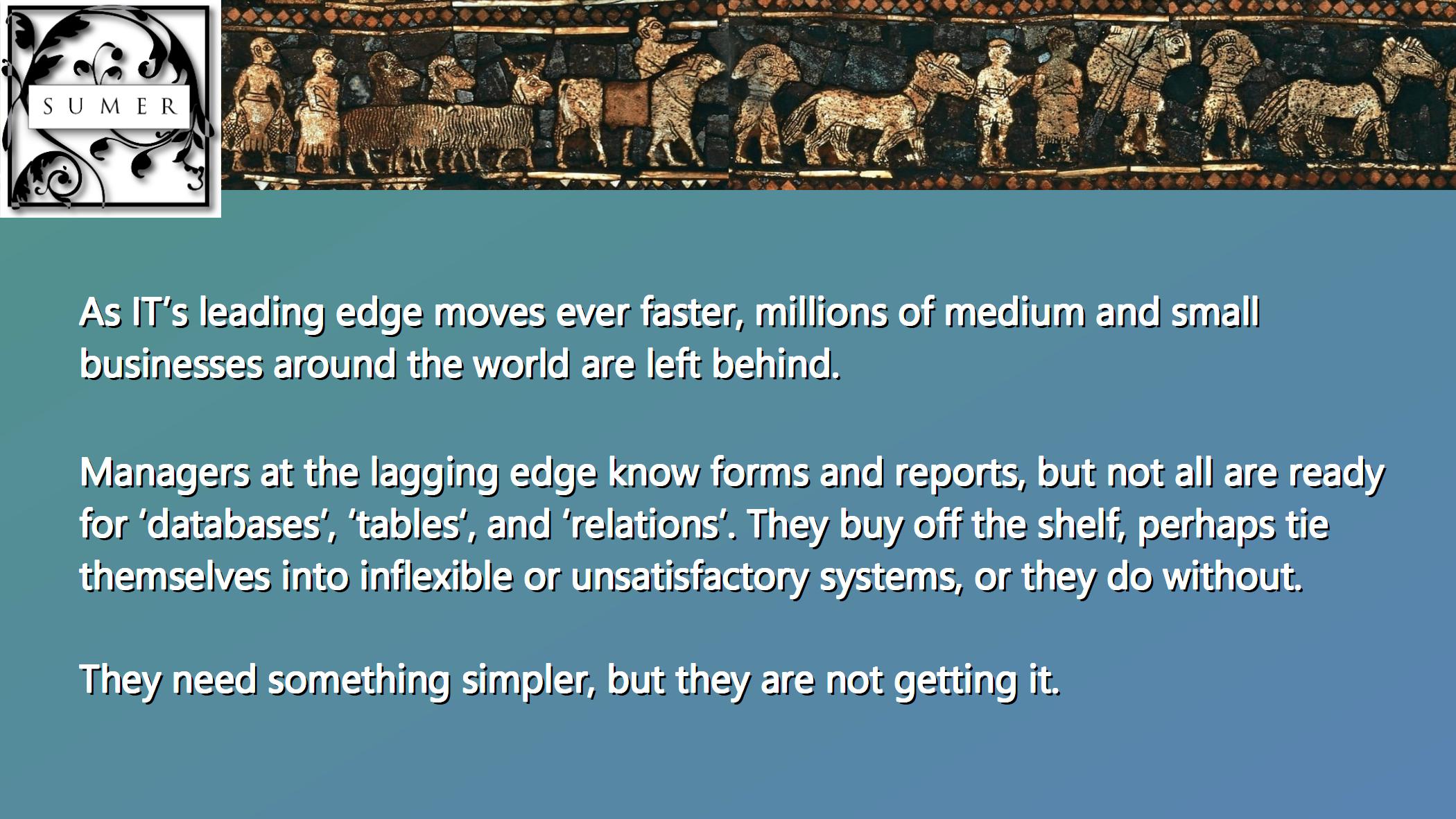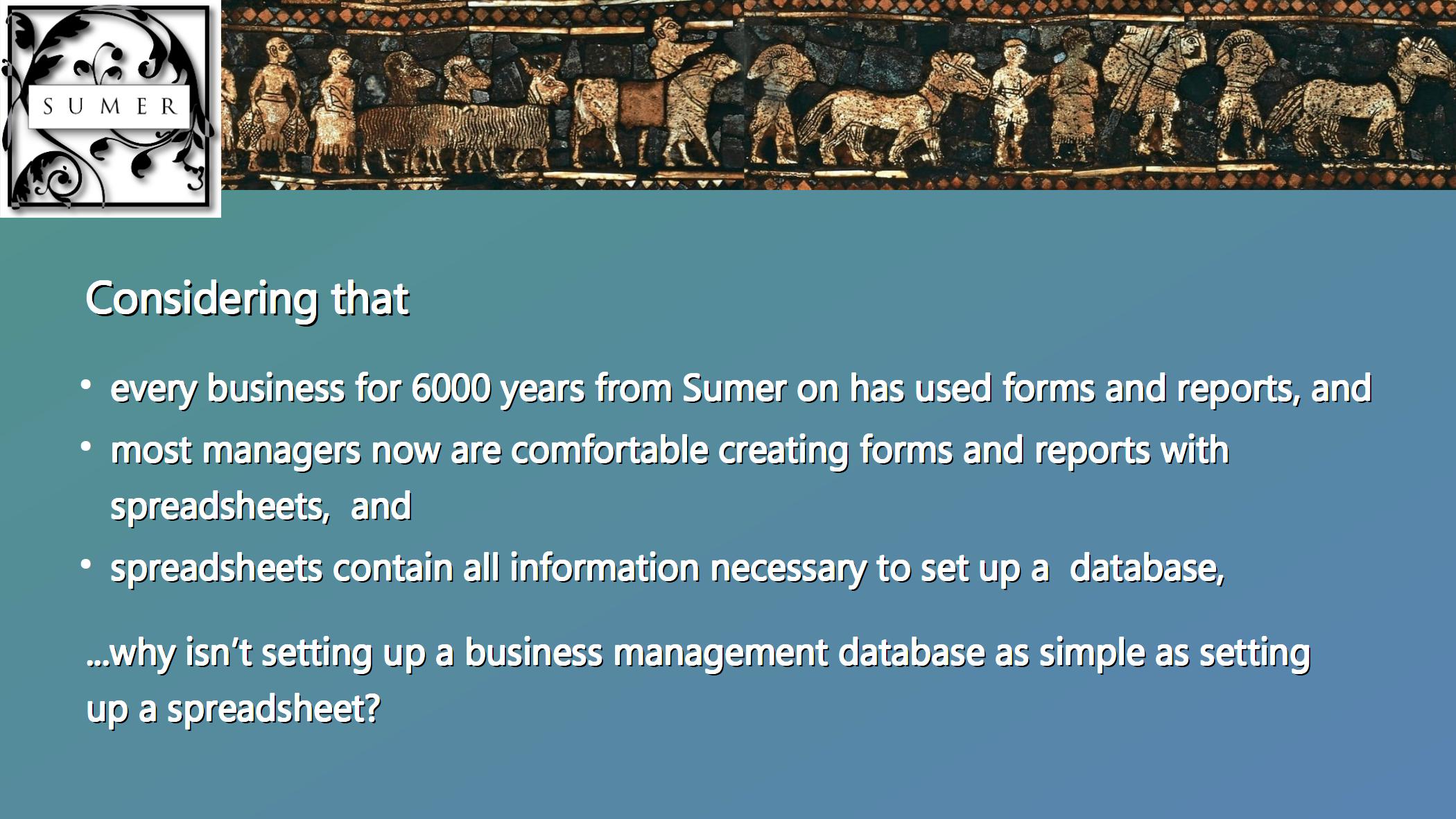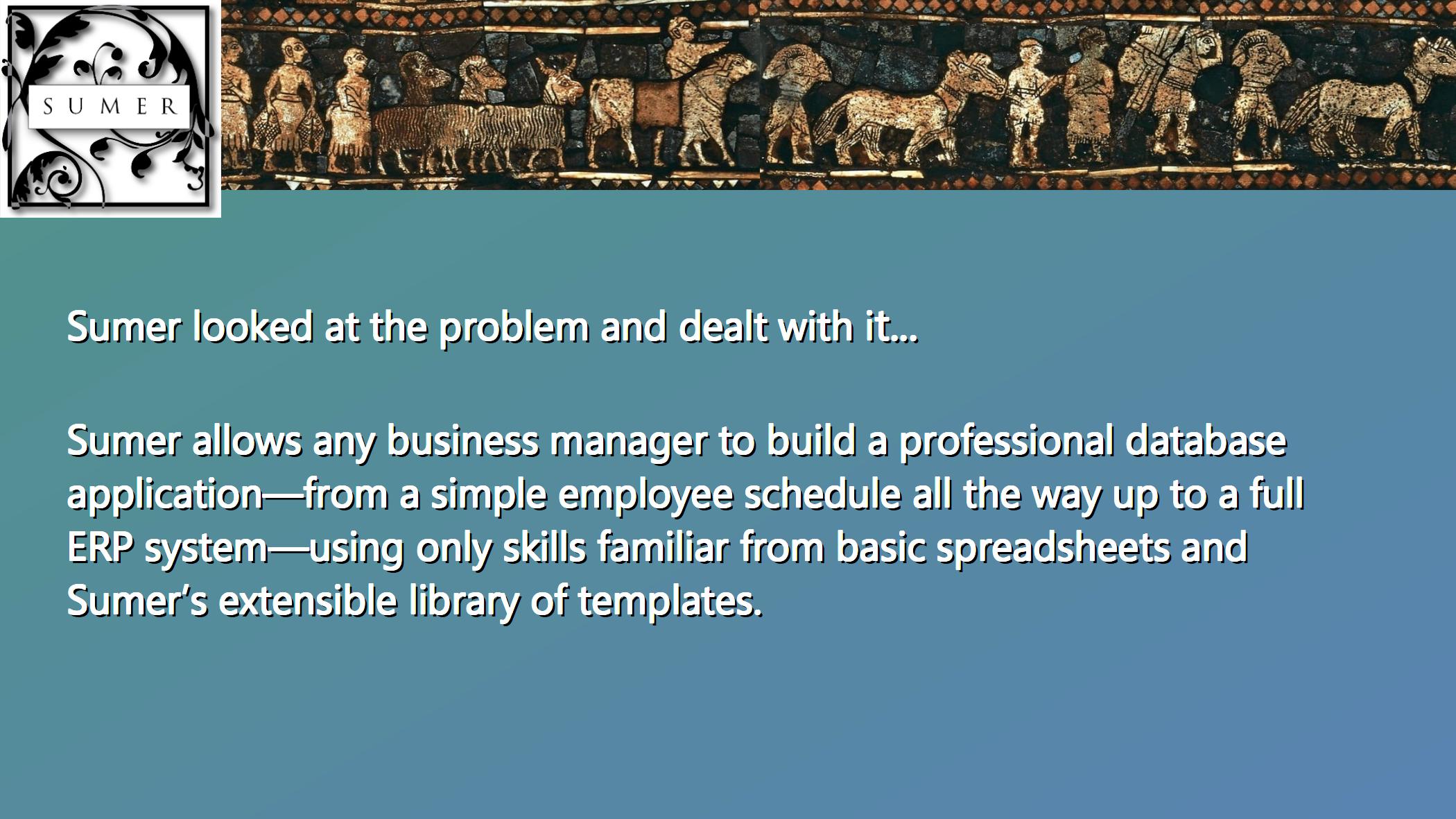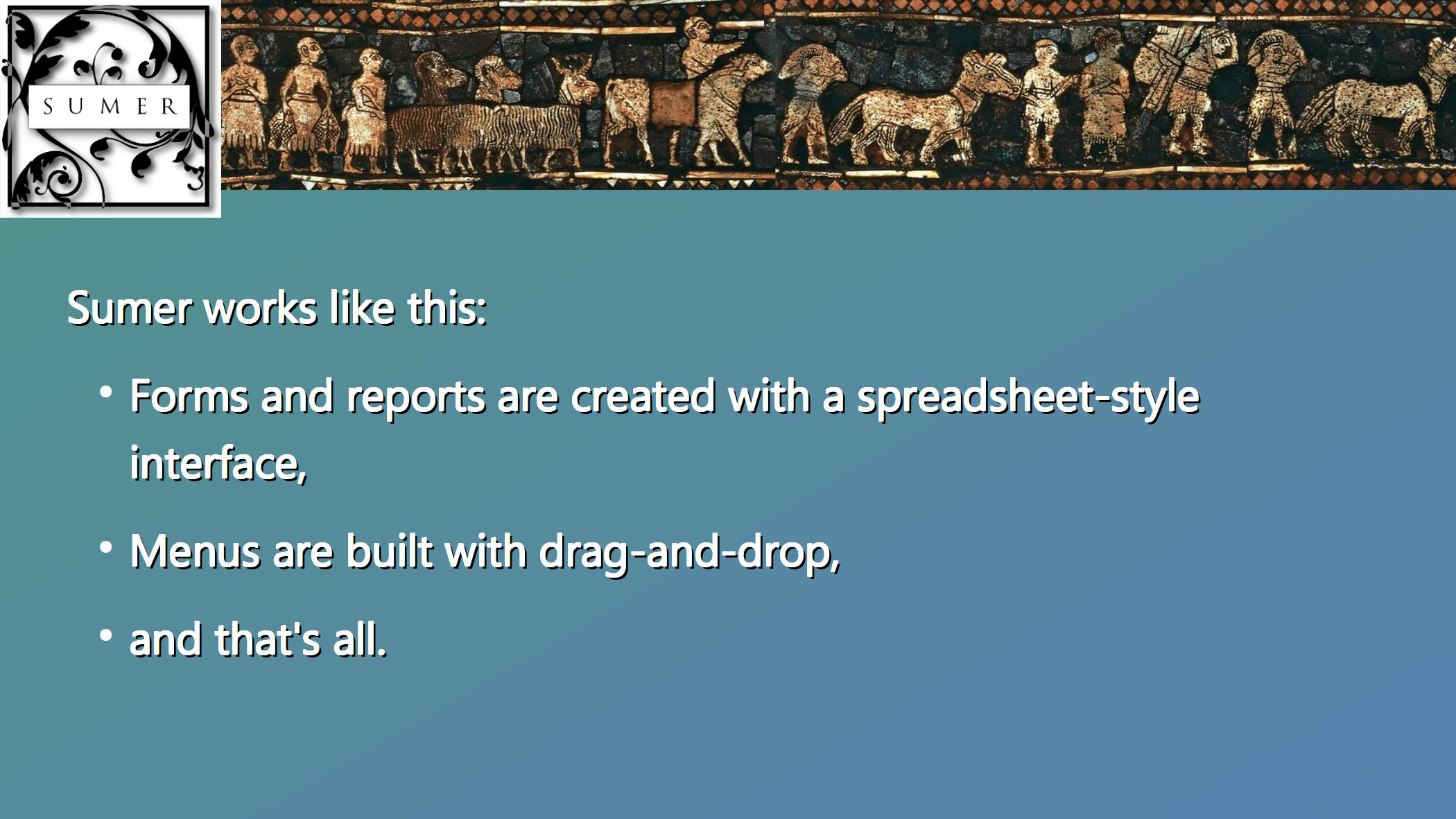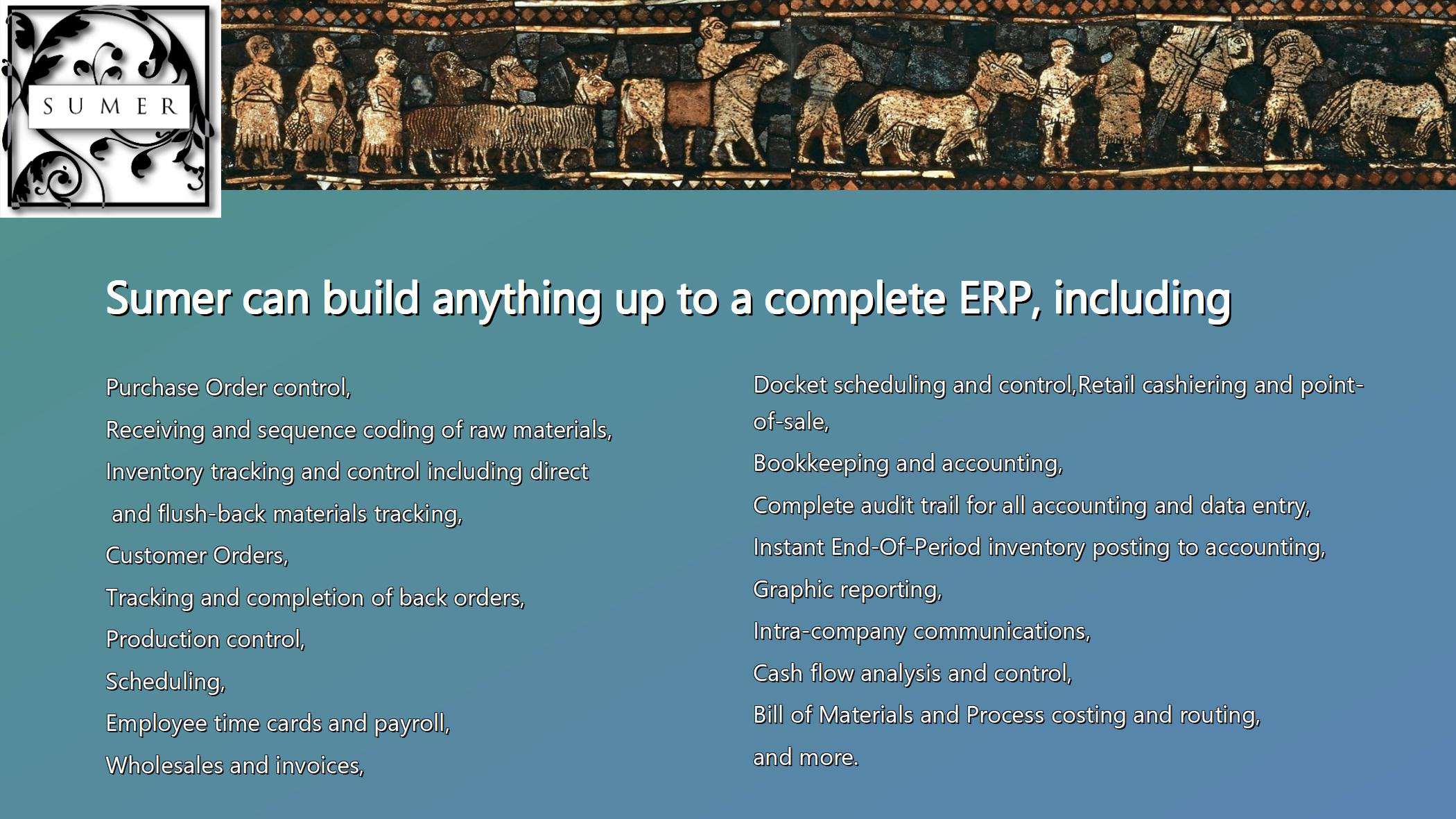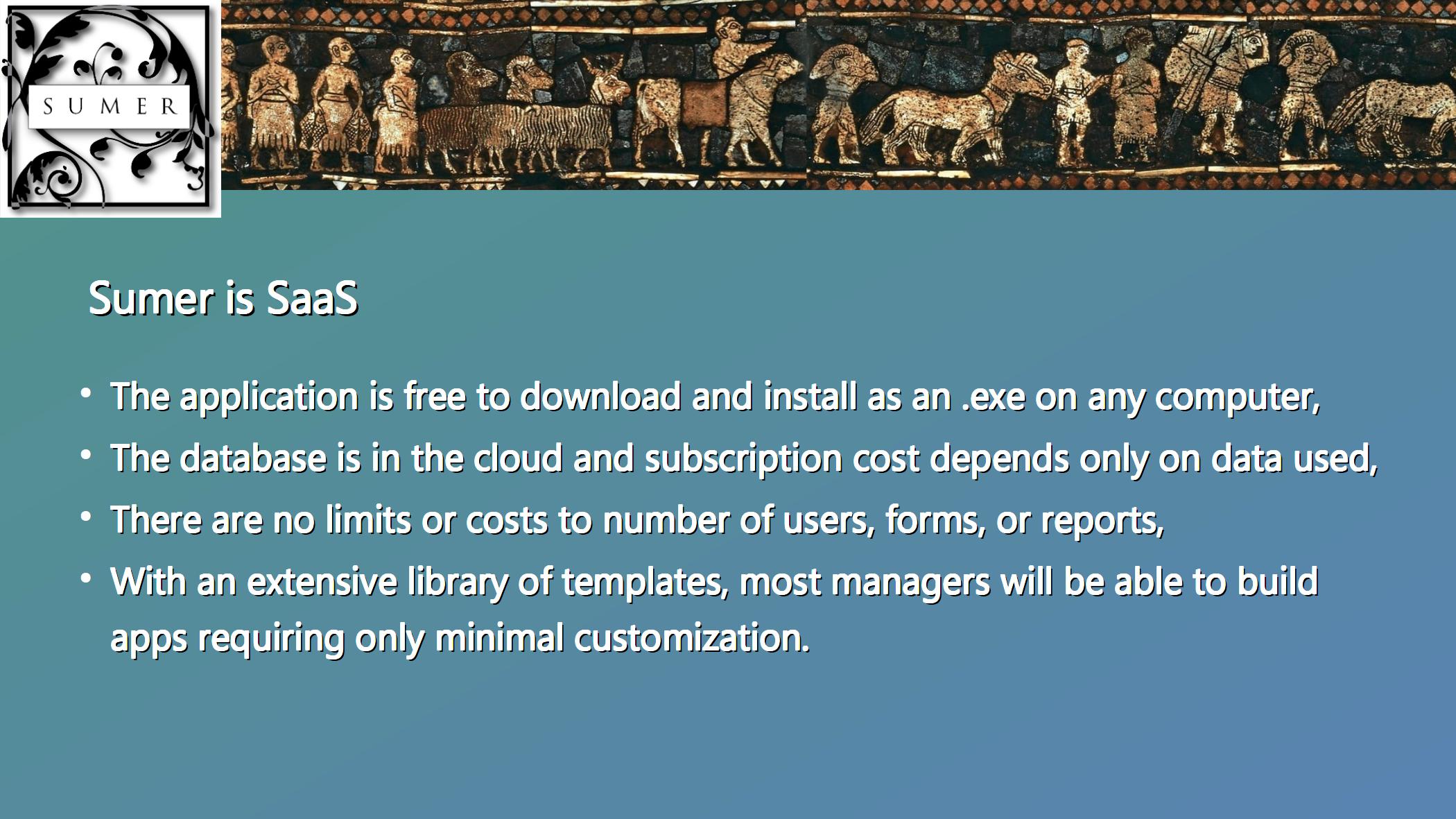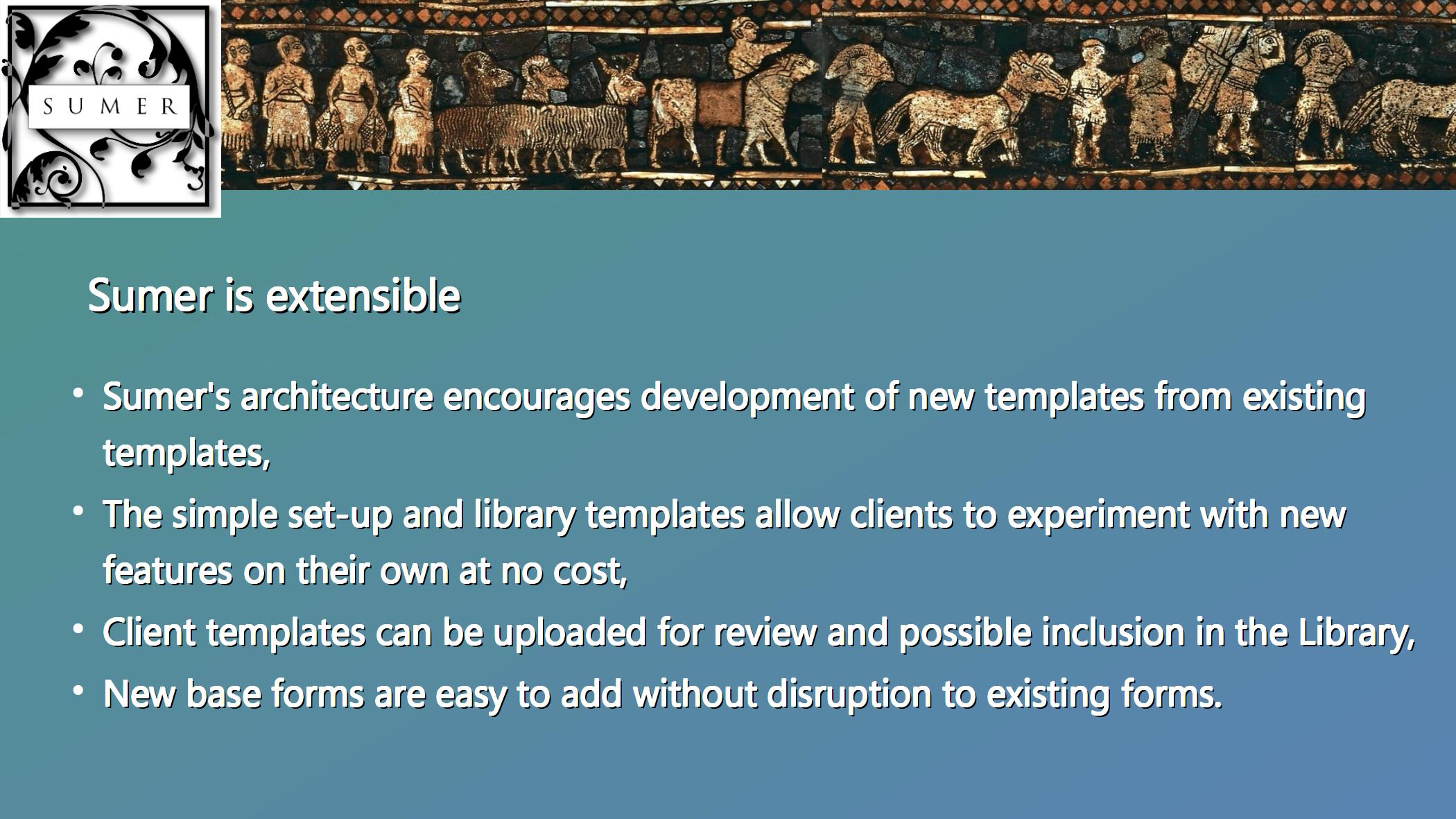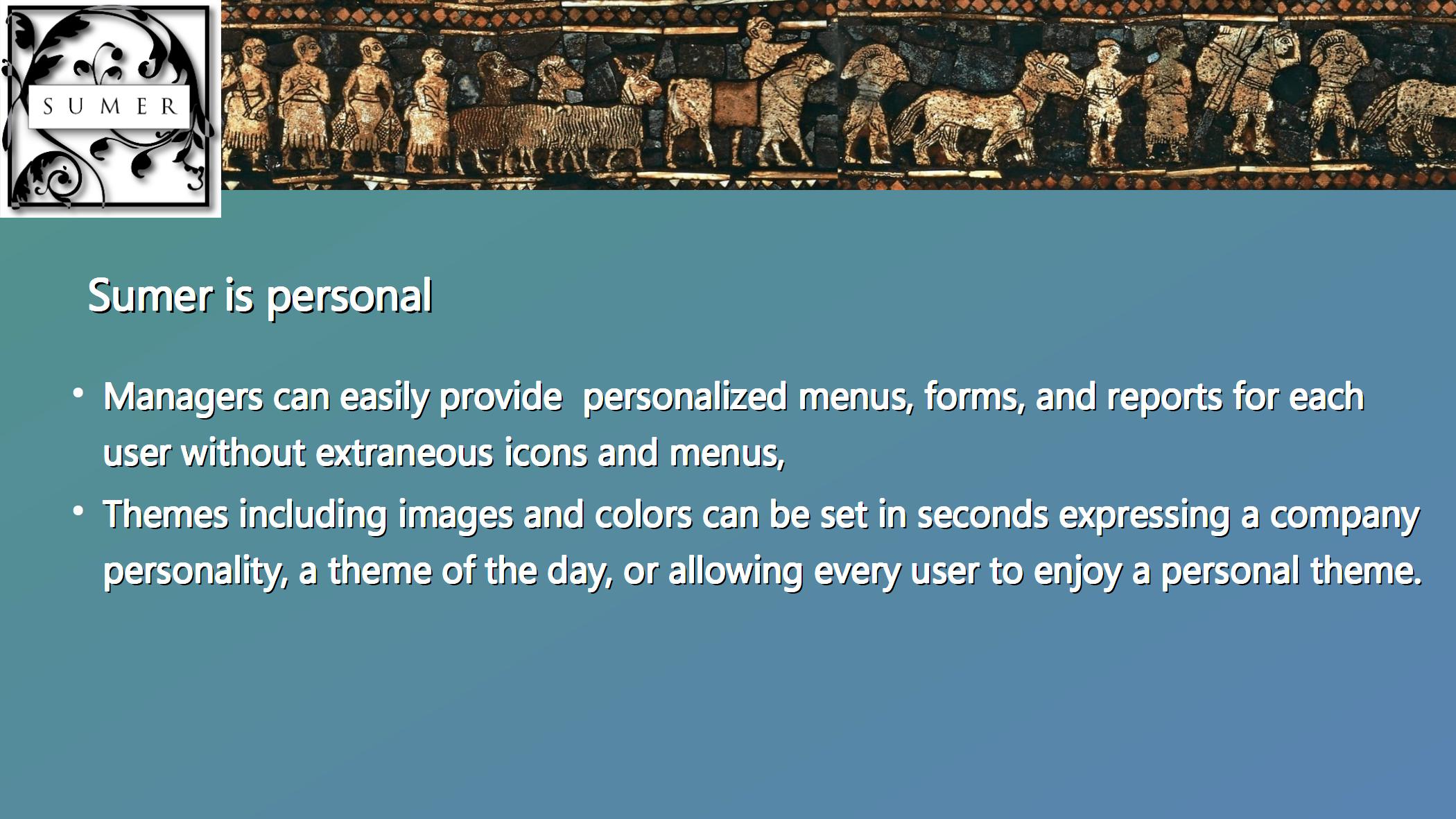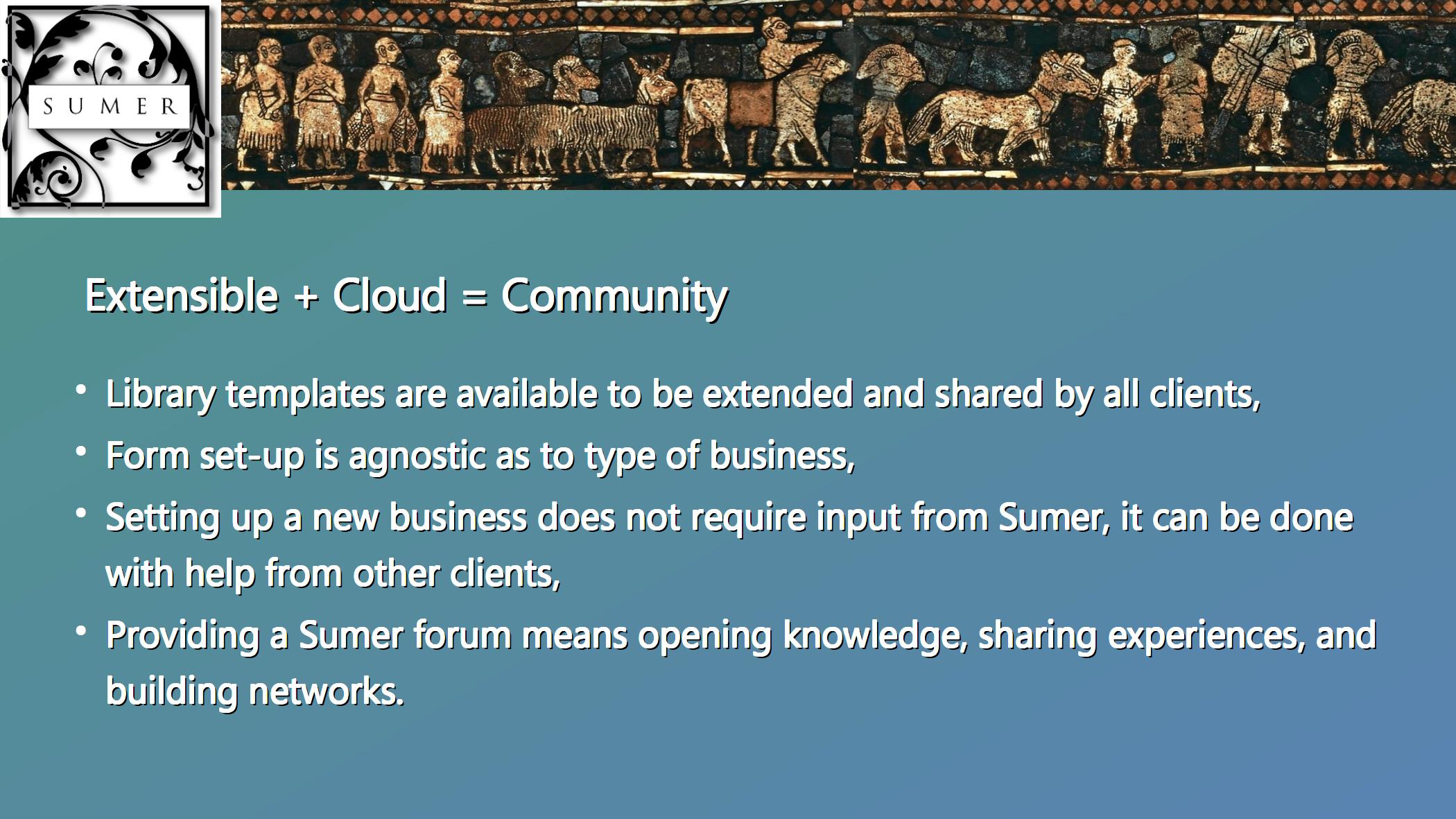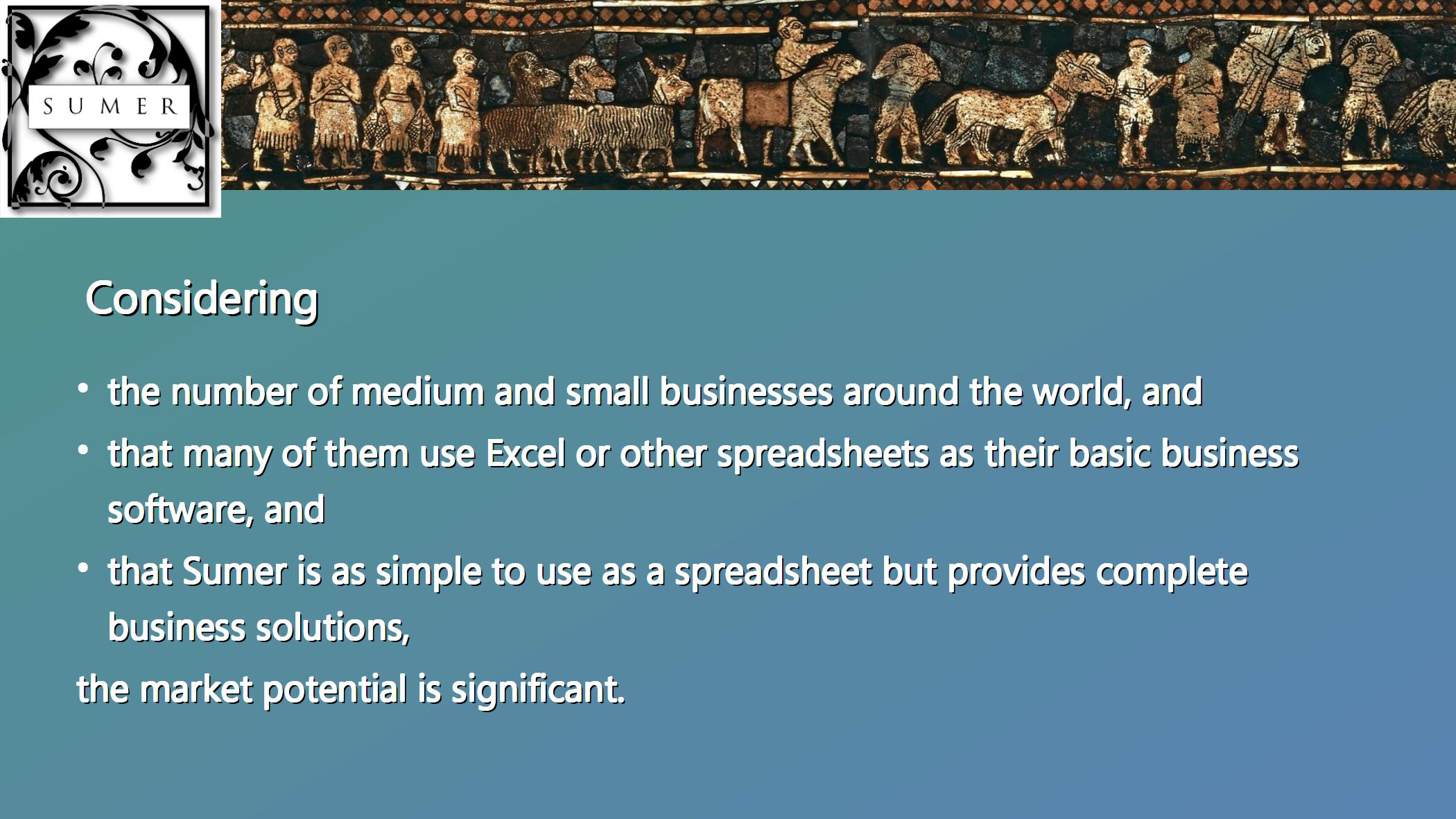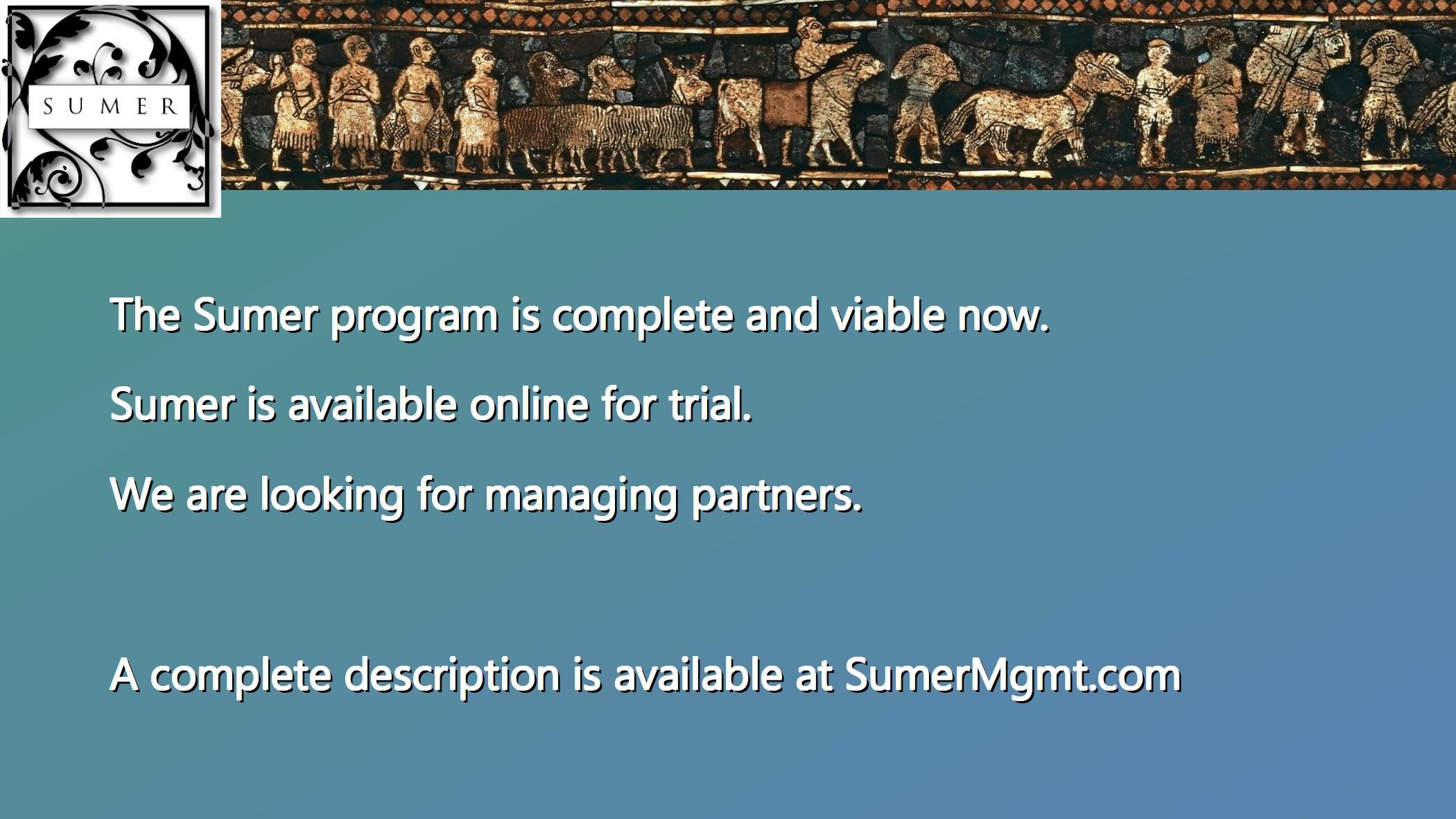Pitch Deck...
Investor groups have an often rigid requirement for documents, including 'Statement of Purpose', the 'Pitch Deck', 'Competitive Analysis', 'Competitive Advantage', etc. So for Sumer:
Summary
Sumer allows anyone to build a professional database application—from a simple employee schedule all the way up to a full ERP system—using only skills familiar from basic spreadsheets and Sumer’s extensible library of templates.
The Problem and the Solution
Medium and small businesses are often caught in a trap: change means they may outgrow their current IT system. Can the old system be updated? Do they need to find a new system, can they afford the time to research the candidates, and can they afford the price? Or should they just add more office staff and put up with their current IT?
Sumer was originally designed to handle a garment manufacturing / wholesale / retail business with over 1000 employees, 14 retail shops plus outlets in department stores, a separate head office located over an hour away from production facilities, with a complex production process involving a combination of hourly, incentive, and piecework wages.
The business was in constant flux. Two in-house programmers were always busy. There were frequent changes to architecture, new tables and relations, new hard-coded forms and reports.
Sumer can handle that business, and it provides a much simpler means for any business to grow.
Sumer Pitch Deck...
Technical stuff
Sumer is intended to be accessible to non-tech users, but explaining the project requires tech-talk:
Sumer breaks from conventional wisdom that relational databases are the best tool for building business management applications. A database is "a structured set of data". A relational database is a particular architecture, but it is taught in all the schools and has become the go-to solution for business databases.
Relational databases are rigid. Large businesses get around this by having large IT teams; they continually change the architecture—manually—so in fact relational database architecture is labor-intensive but highly flexible if you can afford the staff .
Medium and small businesses are stuck with whatever system they last bought. Non-tech-savvy managers have trouble updating their business procedures as needed because the data architecture dictates their options.
Medium and small business database systems should not be miniature versions of large business systems; they are solving a fundamentally different problem and need a different approach.
Sumer hasn't invented anything new, but has re-thought the needs of medium and small businesses to apply existing principles in a new way. Forms and reports have always been at the core of business management, and business managers know how to build them, so Sumer has placed forms in the style of spreadsheets at the center of the database.
Sumer is written in C# and SQL. And despite the earlier trash-talk about relational databases, Sumer actually is a SQL relational database, but in a format accomodating the flexibility needed for Sumer's objectives.
Based on this business-oriented architecture, Sumer has built an extraordinarily user-friendly application.
Business Model
Here is the basic model:
- The Sumer app is free to download and can be installed on any computer as an .exe.
- The database is in the cloud on Azure or similar service.
-
Client subscription costs are based only upon data usage per month:
- No cost to sign up. Note that expenses to Sumer for a new sign-up are near zero.
- Initial usage is free for a limited period or limited data volume, encouraging customers to try Sumer.
- No cost to add users. Sumer encourages adding users to improve efficiency by taking data entry and access closer to the source.
- No cost to access reports or add new forms and reports.
- No pushy sales force.
- Sumer encourages collaborative services, noting that a client can include a service—bookkeeping, for instance, or Bill of Material costing—simply by creating a User / Password / Menu for the service to access the specific data: the Sumer .exe is free to download, the data is in the cloud, the service could be located anywhere in the world.
- Sumer intends to establish a forum for owners / managers / service-providers to encourage communications and recruitment of new clients.
Sumer's ability to extend easy but secure access to services means that service-providers have a strong incentive to promote Sumer as a business platform of their own.
The goal is growth in volume at lowest possible cost to clients by offering extraordinary flexibility and a sense of community that will help spread by word of mouth.
Sumer would be easy to expand globally. The author's personal experience prompted its start in Bali, Indonesia, but Covid altered the plan. Sumer has a language dictionary that can present every command in any language; Sumer could for instance present in either English or Spanish depending on each user's preference.
Competitive Analysis
Let's look at four types of competitors:
- Spreadsheets,
- Niche software purveyors,
- POS (Point Of Sale) systems,
- No-code.
Spreadsheets
Out in the big world a huge number of business try to keep business records on spreadsheets.
Excel can do anything, of course, but it is a poor choice for running a business. Nevertheless it is still promoted by many websites as a good solution for tracking inventory and accounting. Many business owners accept this advice because they are afraid of anything else.
Computer literacy required to build a Sumer application is about on the level of basic Excel. Spreadsheets are probably at the bottom of the heap for software complexity, so we are aiming at a wide target.
Niche Software
Moving on from Excel often means finding a specialty software purveyor for the business's niche market.
For instance grabbing at random the field of dry-cleaning and laundry, Capterra lists CleanCloud, Geelus, Cents, SMRT Systems, CSI Platform, Enlite POS, Comca Systems Cleaner POS, IDryclean, Fabklean, StarchUp, Quick Dry Cleaning Software, Tailwind Systems, Sudzy POS, Lavanda Software, Turns, SmartManager System, TurboClean, Cleanwash, Compassmax, Liberty Touch Control, DryFi, Bundle Connect, WinCleaners, and AlmDesk.
Twenty-five systems to research. Different strengths and weaknesses, costs, add-on modules, customer support, recommendations.
PressedPOS offers a 'netdrive' add-on so the "PressedPOS routing system will email your drivers optimized routes for pickup and delivery, plus track sales & commissions." Sumer does not have that yet, but it can be built from existing forms, and once built it can be made available in the Library for anyone in any niche market.
PressedPOS does not offer employee timecard or bookkeeping, so whatever client chooses PressedPOS will also need to purchase and coordinate other apps.
Niche purveyors typically charge per user, per location, and per add-in module. Basic economics: they actively discourage use of their product.
Niche purveyors also have an interest in tying clients into their system by isolating them, preventing communication with other clients, and keeping the software opaque.
Sumer has a different interest. The actual Sumer program is of course proprietary, but the business management solutions and library templates are open to all.
There is no reason to expect Sumer to quickly sweep the market, but over time as reputation and the library grow—with the addition of dry-cleaner and laundry templates, of course—Sumer would be a good choice for a dry-cleaner who wants to know what they are getting into and that they will have room to expand.
POS or Point Of Sale Services
Regardless of whether a business uses spreadsheets or niche software, it still needs a way to accept payments. Cash is simple but customers increasingly expect to use debit and credit cards.
There are actually two related services tied up in the term 'POS' although many POS providers seem to intentionally blur the issue.
-
Payment processing—
The card reader at a retail cashier counter, or table-side mobile device payments in sit-down restaurants, or any of the other many evolving payment methods, go through a payment processing service that instantly connects card issuing companies and banks and security services to transfer a payment. The business pays a fee, generally in the range of 2% to 3% of the transaction total.
At the barest minimum a business could use hand-written invoices and a calculator to add up a bill, enter the total into the card reader and swipe the card to receive payment. Everything beyond that is actually POS.
-
Point Of Sale services—
The other equipment at the register including screens, cash drawers, and receipt printers are all POS services that are often bundled with payment processing for convenience.
Square—for example—is a leading POS provider. They offer add-on software including creating and printing or emailing receipts, inventory management, on-line sales coordination, customer loyalty and incentive programs, email and SMS marketing, banking solutions, employee scheduling and payroll services, analytics, and more.
From a foot-in-the-door beginning with payment processing, moving on to inventory control—because creating a product price list for a register is already close to an inventory list—POS providers have expanded bit by bit into related management services.
Many POS providers aspire to eventually provide complete business management systems. The Square website pretty much spells it out:
Enterprise Business Resources
It’s essential to keep in mind scalability as you grow and adapt. Whether you’re just starting out as a small business owner, or starting to see significant evolution within your business, Square can offer industry-standard business management software and technology that can evolve as you do.
These tools are future-focused, customized and comprehensive, offering your business the opportunity to thrive even as business and customer needs change from small businesses to enterprises.
From CRM to data automation and accounting, it’s important to think ahead when it comes to deciding on essential enterprise software. See how Square offers a number of large business resources to help you scale as you grow
Square calls this Enterprise Business Resources or EBR, which is certainly more descriptive than the unfortunate sounding ERP or Enterprise Resource Planning. 'Enterprise' means the 'entire business'. But it is unclear whether Square actually has all this yet. They just plan to have it some day.
Adding POS services can be expensive, however, even more so because they are usually added module by module. For fast-growing and enthusiastic start-ups they make a lot of sense. But for businesses that just aspire to continue to provide a decent living for owners and employees, they might be over-kill.
Specifically to investors: Sumer has taken a fundamentally different approach. POS providers have great peripherals as discussed earlier, and they are building business core services by adding new modules. Their business model should work.
Sumer starts with the business core. Sumer is a start-up so has few peripheral services—yet—but they are easy to add. In fact, that is why they are peripherals. Once added they are available to clients with much less difficulty and cost than adding POS modules.
In the long run, Sumer has potential to more than take on the POS providers.
No-Code and Low-Code
Sumer does not require coding, but Sumer does not fit the usual definition of 'no-code' or 'low-code' software development. No-code at present is still programmer talking to programmer about how to set up 'databases', 'tables', 'relations', 'normalization', and 'workflow' using a graphic user interface to reproduce typical code objects. The database is still the center of attention, while forms and menus can be configured to interact with it.
Sumer —at least the part the user can see—looks and acts like a collection of spreadsheets. There is no obvious code-behind, no database terms, and no clear databases.
Candidates for No-Code and Low-Code are tech-minded managers who understand coding concepts and are savvy enough to build high-tech applications without code, often for web apps.
Sumer is looking at the other end of the spectrum. It would be nice to add web apps and mobile support into Sumer , but first things first to build a solid business management foundation.
COMPETITOR WEBSITES include
| HubSpot | www.hubspot.com/business-templates/excel |
| PressedPOS | www.pressedpos.com |
| Square | www.squareup.com |
| Bubble | bubble.io |
Competitive advantage
Genuine need and experience
Personal experience behind Sumer involves a wide range of manufacturing, wholesaling, retailing, and hospitality businesses including both hands-on daily management and software programming.
Sumer was built on the belief that managers are knowledgeable in their fields and need only the support of appropriate software—there is no need for niche software to provide rigid pre-designed forms if the managers are able to design forms for themselves.
Sumer also believes that managers should not waste time filling forms—whether hand-written, in spreadsheets, or computer data entry—that could more easily be entered directly by employees. Why should an office manager enter employee attendance records into a program from hand-written timesheets when supervisors can enter the information directly with a simple push-button?
Rather than focus on ever narrower market slivers, Sumer 's task became to identify patterns that appear repeatedly in all businesses. It is impossible to design a universal business management program, but Sumer has built a program that allows managers to design their own niche management programs.
As Sumer's promise is realized, limitless development of specialized templates—currently with room for up to 999 libraries—will allow Sumer to satisfy most niche markets.
Sumer answers a real, concrete, and long-term need. There is no expectation that Sumer will take off with explosive growth like a dating app or crowd source video game, but eventual growth could be much larger.
It's personal
There is, however, another Sumer advantage. Here we need to add a personal note from the author:
Two businesses I created in Bali, Uluwatu Handmade Balinese Lace and Kori Restaurant and Bar, still exist.
I designed the concepts, architecture, business plans, graphics, management systems, software, and I wrote the stories behind the businesses. Both businesses were wildly successful in their day.
The stories-behind are true in spirit if overly-imaginative in detail. My wife Made Jati and her family, however, eventually used them to claim that they had invented Uluwatu and Kori. And since the management systems ran smoothly, they no longer needed me. My children and I were chased out of Bali.
The significance for Sumer is this: both Uluwatu and Kori have a fan base which at times seems almost evangelical. The reason is the stories-behind, and when I designed and built these businesses I had a deep and genuine respect for Bali which shines forth in the results and touches the customers.
Sumer is built the same way. There is a concern for people and for reaching to the personal level. How can individuals with personal and unique visions compete with franchises? How can managers and employees feel that they are empowered as part of something special? How can people reach out to help one another through community?
This vision is integral to Sumer. Themes allow every business and even every employee to express their own personality. For employees reluctant to return to impersonal offices after working from home, Themes can help establish their own space.
In my business experience, no one buys a new lace dress or fancy dinner because they need it; a deeper emotional need must be met.
For an owner or manager, setting up business is personal. Their work is an important part of their life. They want to put their own stamp on it, they want to be proud of their decisions and their results. When we tell a manager that he or she is knowledgeable, that they have power over the design and look and feel and function of their management system, we give them something special.
Sumer gives managers and employees a place to claim as their own. They are not just filling a job; they are creating something of value to themselves and to others.
Sumer needs investors, partners, and employees who see business needs as human needs and who feel good about satisfying them.
About us
The principal author of Sumer long ago escaped the box:
- Graduated UCSD with High Honors in Molecular Biology,
- Entered the UCLA Molecular Biology Institute PhD program but left to explore the world,
- Travelled Asia, then returned to L.A. to get involved briefly with the film industry,
- Travelled Mexico, Belize, Guatemala, then back to a year of graduate study at UCLA Department of Anthropology,
- Switched to UCLA Anderson School of Business for MBA,
- Left to join an Indonesia / Chinese timber organization with extensive work in Kalimantan, Japan, Korea, Taiwan, Germany, Italy and more,
- Married a Balinese woman, moved to Bali, started and built businesses referred to above Uluwatu Handmade Balinese Lace and Kori Restaurant and Bar, and built homes and villas.
- Organized management through extensive database programs in dBase, Clipper, FoxPro, etc., especially necessary because management skills of available hires were extremely low—no expectation that office staff would be able to use Excel,
- Through all this became a very good database programmer, graphics designer, and business manager.
- After my sons and I fled Bali ahead of multiple death threats—as discussed in the book Eleven Demons - Secrets of Deincarnation in Bali— and detailed at Uluwatu.com and Indonesian Law Advisory.com—decided to use C# / SQL to build a project suggested by my old interest in archeology (Sumer—they used clay trade tokens) and my business experience of programming for multiple scenarios.
Contact Us
